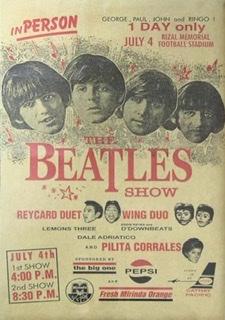
THE BEATLES: ABSAGE AN IMELDA MARCOS LÖSTE SKANDAL AUF PHILIPPINEN AUS
Jens-Uwe BerndtTeilen
Am 4. Juni 1966, also vor 55 Jahren, führte die Absage durch Manager Brian Epstein an die philippinische Diktatoren-Gattin Imelda Marcos zu einem handfesten Skandal. Die „First Lady“ wollte die Beatles bei sich zum Frühstück sehen und sie ihren Kindern präsentieren. Epstein wollte seine Schützlinge aber noch schlafen lassen, da sie erst um 4 Uhr im Hotel eingetroffen waren und am Nachmittag im Rizal Memorial Stadium in Manila auftreten sollten. Die zwei Konzerte vor insgesamt 80.000 bis 100.000 Leuten fanden statt. Die Situation auf den Philippinen wurde für die Beatles aber derart bedrohlich, dass nach diesem Ereignis der Gedanke, nie mehr live aufzutreten, innerhalb der Band immer stärker in den Fokus rückte.
On June 4, 1966, 55 years ago, the refusal by manager Brian Epstein to the Philippine dictator's wife Imelda Marcos led to a tangible scandal. The "First Lady" wanted to see the Beatles at her place for breakfast and present them to her children. Epstein, however, wanted to let his boys still sleep, since they had only arrived at the hotel at 4 a.m. and were to perform in the afternoon at the Rizal Memorial Stadium in Manila. The two concerts in front of a total of 80.000 to 100.000 people took place. The situation in the Philippines became so threatening for the Beatles, however, that after this event the idea of never performing live again came more and more into focus within the band.
On June 4, 1966, 55 years ago, the refusal by manager Brian Epstein to the Philippine dictator's wife Imelda Marcos led to a tangible scandal. The "First Lady" wanted to see the Beatles at her place for breakfast and present them to her children. Epstein, however, wanted to let his boys still sleep, since they had only arrived at the hotel at 4 a.m. and were to perform in the afternoon at the Rizal Memorial Stadium in Manila. The two concerts in front of a total of 80.000 to 100.000 people took place. The situation in the Philippines became so threatening for the Beatles, however, that after this event the idea of never performing live again came more and more into focus within the band.




